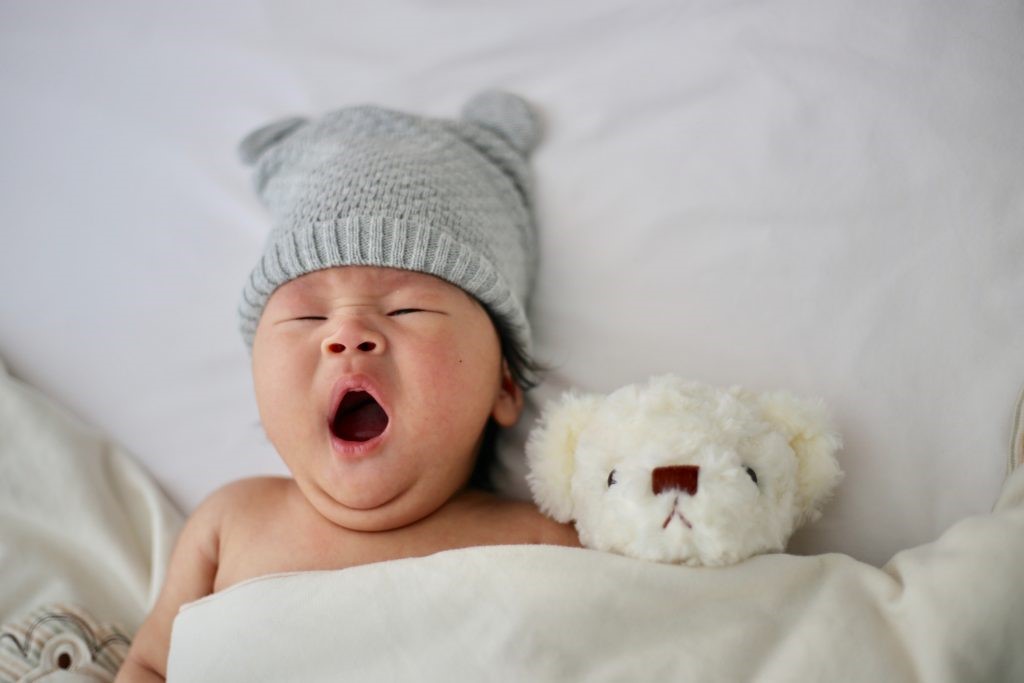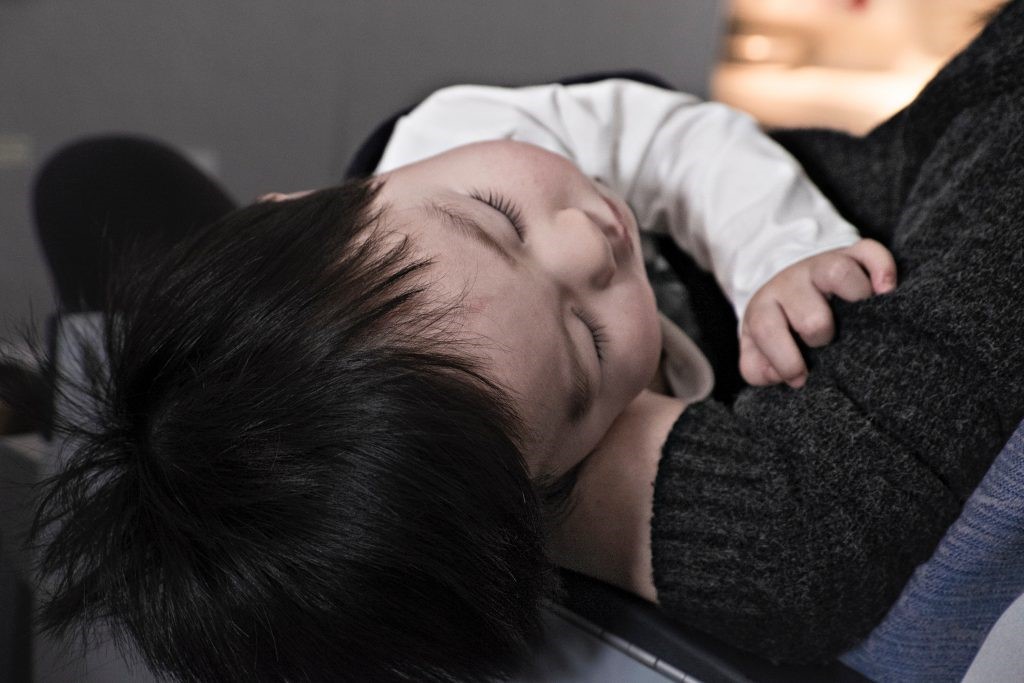

Newborns sleep from 12 to 18 hours per day, and several studies have shown that it is vital to maintain sufficient quality sleep for healthy cognitive development in babies. Quality sleep is also linked to babies’ overall health and mental development, as well as their moods. Poor sleep infancy has also been linked to obesity as a child, and later on as an adult.
Is your baby being cranky or fussier than usual? That is one of the first signs that your baby is sleep-deprived, which can be stressful for both parent and baby. Learn how to recognise some of the tell-tale signs that your baby is not getting quality sleep.

Ensuring that your baby gets sufficient quality sleep can greatly improve their mental health, mood and cognitive brain development in the long run. In this exclusive interview with Dr. Wong, we discover 7 tips to help your babies achieve quality sleep.
#1: Create A Sleep Schedule
When asked if their babies have a bedtime, most parents will give generic answers like ‘after dinner’, or ‘after I rock him to sleep’. One of the determining factors of having quality sleep is to develop a sleep schedule for your baby, meaning a fixed sleep and waking time.
Dr. Wong shares that babies sleep for 2 to 5 hours at a stretch, so observing the cues when their baby is sleepy can help parents develop a sleep schedule based on their child’s behaviour and sleeping patterns.
#2: Swaddle Your Baby
From birth to 4 months old, babies have a startle reflex that causes them to feel as if they are falling. This sensation causes jerking movements that wake them up.
To help your little ones achieve a good night’s sleep, swaddle them in light and breathable fabric to reduce the jerking movements and help them sleep better. Swaddling also mimics the womb environment, creating a sense of security.
According to Dr. Wong, this is a good technique to help over-stimulated newborns achieve less disruptive, quality sleep.
#3: Develop a Bedtime Routine
Since babies have not developed a natural circadian rhythm, a bedtime routine can help them to unwind and signals the body that its bedtime. This also triggers the release of melatonin that makes them feel sleepy.
Dr. Wong shares that the best routine is consistent and practised with love, and ranges from 20 to 45 minutes. An example of a bedtime routine could be dinner, followed by a change of diapers, putting on pyjamas, singing songs, and dimming the lights.
Never rush through a routine, as your baby will be able to sense your nervous energy. Be sure to repeat the bedtime routine in order every night and your baby will soon learn that its bedtime.
#4: Take A Bedtime Bath
A bedtime bath is great for helping your little ones fall asleep easier. However, this varies from baby to baby. Some babies may feel calmer and sleepy after a bath, while other babies may become more active.
Parents may wish to include a bath into your bedtime routine, and see how your baby reacts to it before deciding if it’s a permanent addition to your baby’s bedtime routine.
Dr. Wong adds that bathing is a form of touch therapy that is great for strengthening bonding and security between parent and child while developing a baby’s sensory skills through their sense of smell and touch.
#5: Babies Sleep Better in Dim Environments
Babies tend to fall asleep in brightly-lit environments, like the living room, where parents can keep an eye on them during their downtime. Since they sleep on their backs facing upwards, the harsh glare of the ceiling light is often in their line of sight.
Studies have shown that this glare may be disruptive to babies’ sleep, and a dim environment under 20 lx (International Units of Illumination) creates the ideal sleeping environment for your little ones.
Contrary to what many may think, complete darkness is not the best sleeping environment, as it makes your babies feel uneasy, resulting in disrupted sleep. Consider a crib or rocking chair with a hood to block out the harsh glare from the television or lighting for better sleep.
#6: Don’t Place Baby in Crib Immediately After They Fall Asleep
Once your baby falls asleep in your arms, avoid putting them in the crib immediately as they are still in the light sleep stage. Babies will enter deep sleep stage in 20-25 minutes after falling asleep, and this is a safe time to transfer them into the crib.
Dr. Wong adds that parents can also observe their babies eyelid movements. If there are still movements, they are likely to wake if they notice a change in the environment from their parents’ arms to the crib.
#7: Hang It There Until The 4-Month Milestone
Before your baby is 4 months old, they instinctively tend to wake more frequently during the night as environmental triggers can easily rouse them. From the temperature to hunger pangs or even when they are feeling unwell. Your baby’s circadian rhythm starts to develop around the 4-month mark, and they will tend to sleep for longer stretches during the night.
Don’t ignore your baby when they’re crying as they are signalling or trying to tell you something. Ignoring them will not help them fall asleep faster. Dr. Wong suggests to play with them more during the day to burn off energy, and avoid active games or over-stimulating your baby near bedtime.

Create The Best Sleeping Environment For Your Little Ones
The American Academy of Paediatrics (AAP) recommends room-sharing for newborns, in which a baby’s crib or bassinet is placed in the parents’ room to allow ease of feeding, comforting and monitoring at night. Parents can consider investing in a multi-functional electric rocking chair, which can improve your baby’s sleep quality and help their brains develop optimally.
A dark sleeping environment is ideal for your baby to get quality sleep, and melatonin (sleep hormones) are released in the dark. Combi’s BEDi parenting station can help create a dark environment by shading your baby with a sleep shell. Its innovative dome structure is designed provides a sense of safety, while effectively blocking up to 99.9% of indoor or outdoor light. The sleep shell also shields your baby’s eyes from harmful blue light from the television or lighting, which may hinder the release of melatonin in the body.

Combi’s BEDi parenting station also has a double-sided Dacco Plus newborn cushion to provide support for the baby’s head, back and arms by dispersing the pressure for maximum comfort. Invest in this smart splurge, which comes highly recommended for fussy sleepers, giving parents more downtime for self-care and peace of mind.
Combi’s BEDi Parenting Station retails at $599.
Copyrighted Pregnancy & Baby by Mummys Market 2019


